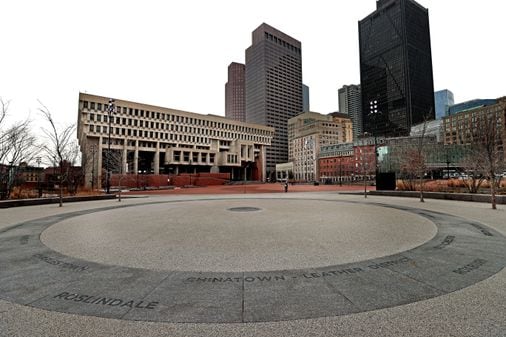As Mayor Michelle Wu pushes to change the city’s tax structure in anticipation of a declining office market, a major credit rating agency affirmed this week that Boston’s finances remain in great shape — at least for now.
As it has for more than a decade, Moody’s Ratings gave Boston the highest possible credit grade, AAA, in a new report; Moody’s cites Boston’s diversified economy and prudent fiscal management. But the report also outlines potential trouble spots ahead, chiefly due to widespread adoption of hybrid and remote work and the related decline in the city’s office market, which makes up 16 percent of its assessed tax base. Moody’s said it’s likely the total value of taxable commercial real estate in Boston could fall next year for the first time since 2010. That, in turn, could hurt tax revenue.
How city officials should respond is a matter of much debate lately.
The Wu administration is seeking approval from the City Council and the state Legislature to raise the tax rate it charges on commercial buildings for five years to mitigate the potential hit to homeowners and apartment landlords. Boston’s commercial tax rate is already two-and-a-half times the residential rate, but Wu’s plan could increase that multiple to nearly three times. City officials say the overall tax bills for many commercial properties would still decline under this scenario, while business groups say this is the wrong time to be raising rates on office buildings and their tenants.
The Moody’s report stays neutral on Wu’s plan — good news for the mayor and her chief financial officer, Ashley Groffenberger.
“They note it’s more of a political challenge than a fiscal challenge for us,” Groffenberger said. “We view it as a positive that they note it, but they don’t view it as good or bad.”
Senior analyst Nicholas Lehman, the report’s lead author, said city officials face a tough balancing act between adding to the already high cost of living — a significant residential tax hike could hit as soon as 2025, an election year, if Wu’s plan isn’t adopted — and pushing more of the tax burden onto commercial landlords and businesses, many of whom are still struggling after the pandemic.
“At the end of the day, the more tools you have to address a challenge, the better,” Lehman said. “By [filing] the home rule petition, they’re adding a tool to the toolbox to address the issue. From a credit perspective, that’s a good thing.”
However, Lehman’s report pointed to two other bills before the Legislature that could also help with budgeting: One that would allow City Hall to raise local hotel and meals taxes and another that could place a fee on the proceeds of real estate sales over $1 million.
And Lehman noted there are other tools to address what he calls a “manageable challenge,” including dipping into the city’s $1.2 billion rainy day fund or paring back expenses.
That’s exactly what critics such as the Boston Municipal Research Bureau, a business-backed budget watchdog, and the Greater Boston Real Estate Board have been saying.
Marty Walz, the research bureau’s interim president, pointed to Boston’s high personnel costs and education costs in particular that Moody’s cited as “credit challenges.” Her group recently released its own report with a list of potential alternatives that include cutting expenses and using some of the city’s savings.
“This is saying there’s not one path to addressing this potential problem,” Walz said of the Moody’s report. “It means the mayor has got a fair amount of flexibility. So does the city council. [But] a clear-eyed view would suggest there’s trouble on the horizon and we should not be satisfied with where we are today.”
Jon Chesto can be reached at jon.chesto@globe.com. Follow him @jonchesto.










